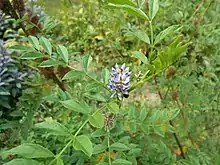Glycyrrhiza echinata
Glycyrrhiza echinata is a species of flowering plant in the genus Glycyrrhiza, with various common names that include Chinese licorice,[3] German licorice,[3][4] and hedgehog licorice,[3] Eastern European licorice,[5] Hungarian licorice,[6] Prickly licorice,[7] and Roman licorice.[8] It is used as a flavoring and medicinally, and to produce Russian and German licorice.[9]
| Glycyrrhiza echinata | |
|---|---|
 | |
| Scientific classification | |
| Kingdom: | Plantae |
| Clade: | Tracheophytes |
| Clade: | Angiosperms |
| Clade: | Eudicots |
| Clade: | Rosids |
| Order: | Fabales |
| Family: | Fabaceae |
| Subfamily: | Faboideae |
| Genus: | Glycyrrhiza |
| Species: | G. echinata |
| Binomial name | |
| Glycyrrhiza echinata | |
| Synonyms[2] | |
| |
Wikimedia Commons has media related to Glycyrrhiza echinata.
Distribution
Glycyrrhiza echinata is native to Southeastern Europe, adjacent parts of West Asia and East Asia.[8]
Taxonomy
Glycyrrhiza echinata was one of the species described by Carl Linnaeus in his 1753 work Species Plantarum, the starting point for botanical nomenclature. The Latin specific epithet of echinata refers to hedgehog, from echinus, meaning 'prickly'.[10]
References
- "Glycyrrhiza echinata L." Integrated Taxonomic Information System. Retrieved November 8, 2013.
- The Plant List: A Working List of All Plant Species, retrieved 7 March 2017
- USDA GRIN Taxonomy, retrieved 7 March 2017
- BSBI List 2007 (xls). Botanical Society of Britain and Ireland. Archived from the original (xls) on 2015-06-26. Retrieved 2014-10-17.
- Zoë Gardner & Michael McGuffin (2013). "Glycyrrhiza spp.". American Herbal Products Association's Botanical Safety Handbook (2nd ed.). CRC Press. pp. 417–422. ISBN 9781466516946.
- Debra Rayburn (2007). "Licorice". Let's Get Natural with Herbs. Ozark Mountain Publishing. pp. 265–266. ISBN 9781886940956.
- Shmida, Avi (2005). MAPA's Dictionary of Plants and Flowers in Israel (in Hebrew). Tel-Aviv: MAPA. p. 362. OCLC 716569354.
- Johannes Seidemann (2005). "Glycyrrhiza L. – licorice, liquorice, sweetwood – Fabaceae (Leguminosae)". World Spice Plants: Economic Usage, Botany, Taxonomy. Springer. pp. 169–170. ISBN 9783540222798.
- Plants for a Future, retrieved 8 March 2017
- Stearn, William (2004). Botanical Latin. Portland, Oregon: Timber Press. ISBN 9780881926279.
This article is issued from Wikipedia. The text is licensed under Creative Commons - Attribution - Sharealike. Additional terms may apply for the media files.